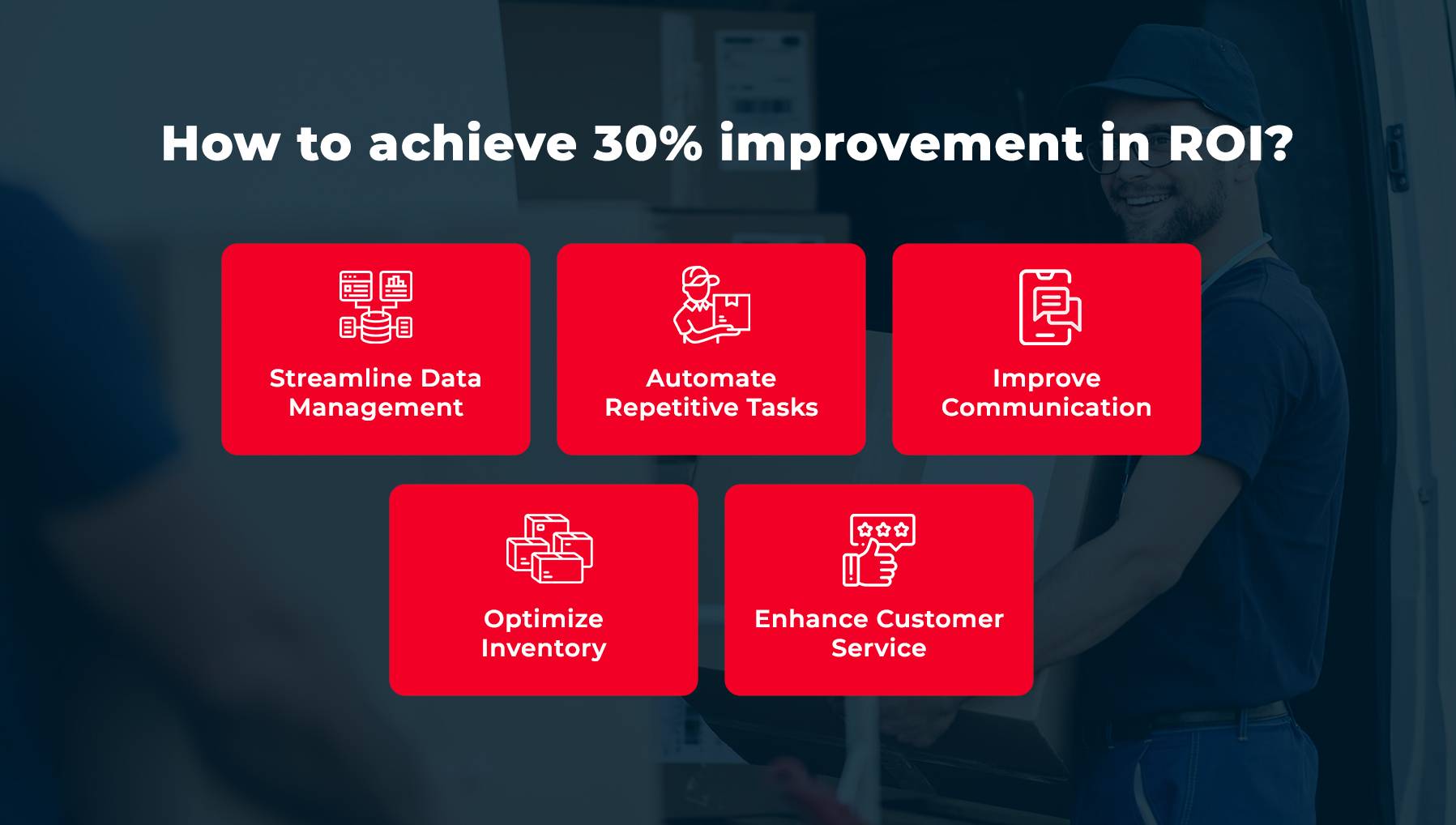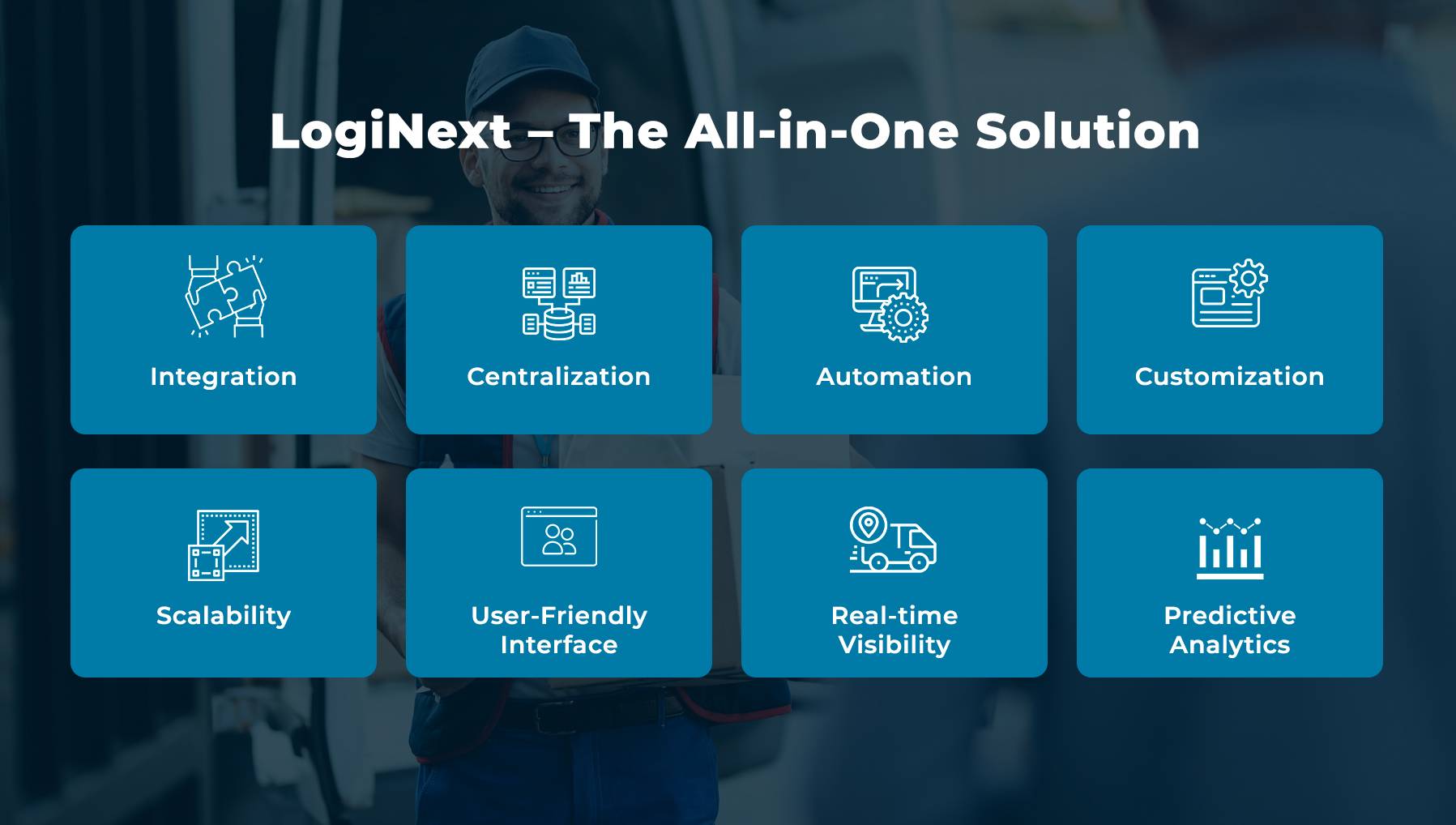
Integrating an ERP System with Logistics Management Software for a 30% Boost in ROI
In the modern supply chain craziness, one company that stands out in supply chain management is Swift Logistics. Meet Grace, the Operations Manager, handling procurement, logistics, and distribution. Utilizing advanced logistics management software, Grace’s team forecasts demand, procures inventory, and maintains optimal stock levels without excess or shortages.
Companies that integrate their ERP and logistics management software experience a 20% reduction in logistics costs and a 30% increase in operational efficiency.
Using routing and transportation management systems, orders were delivered throughout the city. This helped minimize transit times and environmental impact. Real-time tracking keeps the team vigilant, allowing swift adaptation to any disruptions in the supply chain. Yet, it’s the people who truly make the difference. United by a dedication to excellence, her team navigates challenges together, celebrating successes and driving innovation.
Essential Factors Impacting Supply Chain Success
Technology: Think of technology as the engine driving the supply chain train. From advanced tracking systems to predictive analytics, technology keeps everything running smoothly.
85% of companies use real-time monitoring of goods and materials throughout the supply chain.
Resource Power: Picture a team of skilled individuals, each bringing their unique strengths to the table. It’s not just about having resources; it’s about harnessing their power effectively.
Teams that effectively harness the collective power of diverse skill sets report a 25% reduction in supply chain costs.
Implementation: Like building a house, a supply chain is only as strong as its foundation. Proper implementation of strategies and processes is vital for long-term success.
Companies that align supply chain strategies with overall business objectives achieve a 25% increase in profitability.
Data: Data is like the compass guiding the ship through stormy seas. With accurate and timely information, decisions can be made swiftly and confidently.
Timely access to data reduces decision-making time by 50%, enabling faster response to market changes and customer demands.
Quick Read: What Are The Best Logistics Management Software Tools And Techniques?
Making Logistics Smoother: Enterprise Resource Planning (ERP) x Logistics Management Software (LMS) x Transport Management System (TMS) in one!
Enter ERP, LMS, and TMS – the unsung heroes of logistics. These systems streamline processes, minimize errors, and maximize productivity.
Enterprise Resource Planning: Centralizes data and automates core business processes, such as inventory management and order processing, improving overall efficiency and accuracy.
1.4 million companies are expected to spend $183 billion on ERP software in 2024.
Logistics Management Software: Optimizes the movement of goods from point A to point B. It additionally tracks shipments in real-time, and manages transportation routes to minimize costs and delivery times.
65% of the logistics managers showed awareness to undertake business model transformations to effectively navigate and prosper in the digital era.
Find Out- Top 7 Best Logistics Management Software Solutions
Transportation Management System: Simplifies the planning, execution, and optimization of transportation activities. Thus ensuring timely deliveries while minimizing fuel consumption and carbon emissions.
Healthcare and Pharmaceutical companies would be the largest customers for TMS solutions by 2025.
How does Intelligent Logistics Management Software Help Achieve a 30% Improvement in ROI?

Streamline Data Management: One of the key benefits of integrating ERP with logistics management software is the ability to centralize data. This means no more duplicate entries or discrepancies between systems. All relevant information, from orders to inventory levels, is accessible in one place, making it easier to track and manage.
Automate Repetitive Tasks: Say goodbye to manual data entry and tedious paperwork. With integrated systems, you can automate repetitive tasks such as order processing, invoicing, and inventory management. This not only saves time but also reduces the risk of errors and delays.
Improve Communication: Effective communication is crucial in logistics. By integrating ERP with logistics management software, you can ensure seamless communication between departments, suppliers, and customers. Real-time updates and alerts keep everyone in the loop and enable faster decision-making.
Don’t Miss: The Power Of Alerts And Notifications in Logistics Management Software
Optimize Inventory: Inventory management is a balancing act. Too much inventory ties up capital, while too little can lead to stockouts and missed opportunities. Integrated systems provide better visibility into inventory levels, demand forecasts, and supplier lead times, allowing you to optimize inventory and reduce carrying costs.
Enhance Customer Service: In today’s competitive market, exceptional customer service sets you apart from the competition. Integrated systems enable faster order fulfillment, accurate tracking, and proactive communication with customers. The result? Higher satisfaction levels and repeat business.
Download White Paper: How Logistics Management Software helps with 30% improvement in ROI.
LogiNext – The All-in-One Solution For Logistics Management Needs
Meet LogiNext, the one-stop shop for all your logistics needs. With LogiNext, you get the best of ERP, LMS, TMS, and more, all in a single platform. We leverage cutting-edge technology and powerful algorithms to streamline every aspect of your supply chain, from inventory management to last-mile delivery. With real-time tracking, predictive analytics, and seamless integration with existing systems, we ensure maximum efficiency and visibility at every step of the journey.

Integration:
LogiNext’s robust architecture allows for seamless integration with existing systems, such as ERPs, LMSs, and TMSs. This means that companies can leverage their current infrastructure while still benefiting from LogiNext’s advanced features.
Centralization:
By centralizing all supply chain functions onto one platform, LogiNext eliminates the need for multiple systems. This streamlines operations, reduces complexity, and increases overall efficiency.
Automation:
LogiNext automates repetitive tasks and processes, freeing up valuable time and resources. From order processing to inventory management, automation ensures accuracy and consistency while minimizing human error.
Customization:
We understand that every supply chain is unique. That’s why our platform offers customizable features and workflows tailored to each company’s specific needs. Whether it’s creating custom reports or configuring alerts, LogiNext empowers companies to tailor the platform to their exact requirements.
Scalability:
As companies grow and evolve, so do their supply chain needs. LogiNext’s scalable platform can adapt to accommodate changing requirements, whether it’s handling increased order volumes or expanding into new markets.
User-Friendly Interface:
LogiNext’s intuitive interface makes it easy for users at all levels to navigate and utilize the platform effectively. With simple dashboards, drag-and-drop functionality, and guided workflows, users can quickly access the information they need and perform tasks with ease.
Real-time Visibility:
LogiNext provides real-time visibility into every aspect of the supply chain, allowing companies to track shipments, monitor inventory levels, and analyze performance metrics on the fly. This real-time data enables proactive decision-making and helps companies identify and address issues before they escalate.
Predictive Analytics:
Leveraging advanced predictive analytics algorithms, LogiNext can forecast demand, anticipate supply chain disruptions, and optimize resource allocation. By analyzing historical data and market trends, LogiNext helps companies stay ahead of the curve and capitalize on opportunities.
Must Read: The Ultimate Guide To Logistics Management Software
Your One-stop Solution for Logistics Management Software Needs
The integration of ERP systems with logistics management software emerges as a beacon of efficiency and profitability. Through the journey of Swift Logistics and Grace’s adept management, we’ve witnessed firsthand the transformative power of integration. By leveraging advanced technology and fostering a culture of collaboration, companies can unlock a 30% boost in ROI. Additionally, get other benefits including cost reduction, operational efficiency, and enhanced customer satisfaction.
As we navigate the complexities of modern logistics, it’s evident that success hinges on embracing innovation, optimizing resources, and making informed decisions. Whether it’s streamlining data management, automating repetitive tasks, or harnessing the predictive power of analytics, the path to profitability is paved with integrated solutions like LogiNext. With its seamless integration, centralized platform, automation capabilities, and real-time visibility, LogiNext exemplifies the pinnacle of supply chain efficiency. Let’s bid farewell to manual processes and siloed systems. Together, we embark on a journey towards a future where logistics isn’t just about moving goods, but about transforming possibilities. Click on the red button below to speak with our expert.
69







@LogiNext